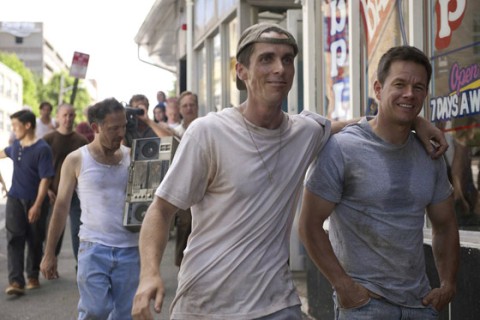The Fighter

Boxing movies are hardly ever about boxing. Instead, they use boxing as a vehicle to explore larger issues such as raw ambition (Champion), fading hope (The Set-Up), racism (The Great White Hope), institutional corruption (The Harder They Fall), fading pride (Requiem for a Heavyweight), personal redemption (Rocky) and, in perhaps the greatest of all boxing films, Raging Bull, the inner workings of a damaged psyche. For decades, boxing in the movies has represented the chance for a young tough with limited opportunities to make something out of himself. This is articulated by Marlon Brando in On the Waterfront, portraying an ex-boxer who tells his crooked older brother that he should have watched out for him, that "I coulda been a contender, I coulda had class."
David O. Russell's The Fighter is also about class, but in this case it's the social kind. The film is based on the true story of "Irish" Micky Ward (Mark Wahlberg), a welterweight out of hardscrabble Lowell, Massachusetts, who fought in the 1980s and '90s. This boxing movie's real subject is the pull of family, Micky's greatest obstacle to achieving "class."
Read our latest issue or browse back issues.
The dilemma is skillfully laid out in the first act. Micky lives in the shadow of his older brother, Dicky (Christian Bale), a once-promising fighter who has gone to seed and picked up a serious crack habit along the way. Dicky is a character straight out of Eugene O'Neill, a pipe dreamer who still talks about his glory days (he once knocked down Sugar Ray Leonard) and continues to harbor fantasies about making a comeback and living up to his nickname, the "Pride of Lowell." His delusion is fed by the rest of his whacked-out family, especially his mother, Alice (Melissa Leo), who clearly favors the goofy Dicky over the quiet and more serious Micky.
Alice is also Micky's manager, and she has a knack for getting him fights in which he's overmatched and takes a serious beating. As a result, Micky is rapidly turning into a "stepping stone," a sacrificial lamb whom rising stars beat to a pulp on their way up the ladder. This is a role that Micky neither wants nor deserves. He has talent, but the question is whether he has the courage to walk away from his cloying family and make it on his own.
This is not an easy decision for Micky, since there is a part of him that still feels he needs his family—especially Dicky, who trains him and imparts his ring savvy and fighting experience (when he's not strung out at the local crack house). The subtle suggestion is that deep down Micky feels he doesn't deserve to move up, as if besting his brother would be an act of familial disloyalty.
Luckily, he hooks up with Charlene (Amy Adams), a bartender and college dropout who seems drawn to Micky's melancholy and vulnerable side. Charlene recognizes that Micky's family—including his five big-haired sisters—are a bunch of "scumbags." She works to build up his sense of autonomy, even as they are falling hard for each other.
There is nothing new or unique in The Fighter. We have seen many of its plot twists and characters before. But the combination of spicy dialogue, gritty cinematography and superior acting puts it in an elite realm. Bale, in particular, is stupendous as the damaged Dicky, doing all sorts of little things as he jumps and jukes around to let us know what is really going on inside his addled brain. Leo and Adams have somewhat stereotypic roles but milk every drop of life out of them.
They shine in part because Wahlberg's performance is so generous and low-key. He plays the straight man to his showy costars, showing genuine emotion only when he is in the ring, looking every bit the fighter he is portraying. The Fighter is one of those always-welcome ensemble pieces that is, thanks to the vision of a talented director, even better than it should be.






